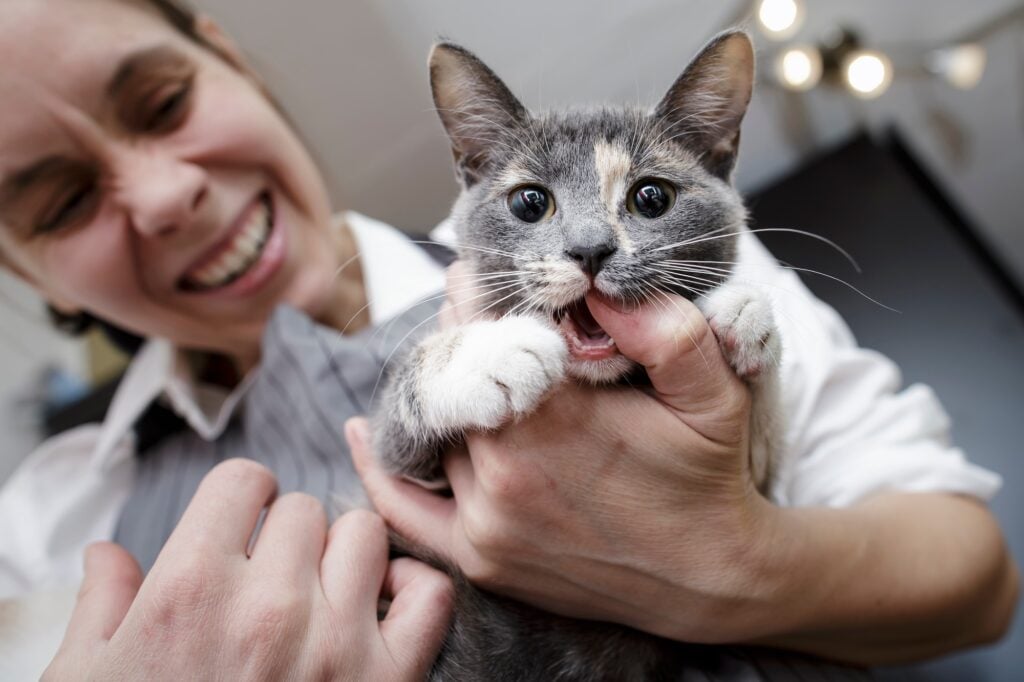Kittens Bite Explained: Causes and Effective Solutions
Table of Contents
Is your kitten constantly nibbling on your hands or feet? You’re not alone. Many new kitten owners face this challenge. However, this behavior is completely normal, especially in the early stages of their life. Kittens use their mouths to explore and learn, and gentle biting is a natural part of how they play. While it’s normal, it doesn’t mean you have to put up with it forever.
In this guide, our expert Veterinarians at Autumn Trails and Veterinary Center explain the reasons behind kitten biting and share proven tips to help you train your kitten toward gentler play.
Why Do Kittens Bite?
Here are a few reasons why kittens bite:
1. Play and Exploration
- Kittens experience the world through their mouths. Just like human babies, they use chewing and biting as a way to learn about their surroundings.
2. Teething
- Between two to six months of age, kittens go through teething. This can cause discomfort and lead to more frequent chewing or biting.
3. Hunting Instincts
- Cats are natural predators. Even in a safe home environment, kittens practice hunting skills through play, biting, pouncing, and chasing.
4. Overstimulation
- Sometimes, too much petting or play can cause sensory overload, leading a kitten to bite as a way of saying, “That’s enough.”
5. Excess energy
- A kitten brimming with energy but lacking proper outlets may resort to biting as a way to burn it off. Incorporating regular, interactive play sessions with indoor cats and kittens into their daily routine gives them a healthy way to release that energy and reduces the urge to bite you.
6. Hunger, stress, or anxiety
- Just like humans, kittens can get irritable when they’re hungry, stressed, or adjusting to a new environment or schedule. Changes in their surroundings or routine may cause them to feel uneasy, and biting can become a way to express that discomfort.

How to Stop a Kitten from Biting?
- The good news is that you can teach your kitten to reduce or stop biting with patience, consistency, and the right techniques. Redirecting a kitten’s biting behavior begins with understanding their instincts and providing appropriate outlets for their energy.
Positive reinforcement and consistent training are key to helping kittens develop good habits and preventing biting from becoming a persistent issue.
Here’s a breakdown of proven strategies to help you train your kitten.
1. Training Your Kitten
Training plays a vital role in guiding your kitten toward better behavior. These techniques can be especially effective:
Reward-based training
- Whenever your kitten resists the urge to bite, reward them with treats, gentle praise, or affection. Positive reinforcement helps them link desirable behavior with good outcomes, making them more likely to repeat it.
Teaching bite inhibition
- If your kitten bites, make a sharp “ouch” or firm “no” to mimic how their littermates would respond. Immediately stop playing and only resume once they’ve calmed down. This teaches them that biting ends playtime, something they’ll quickly want to avoid.
2. Redirecting Biting Behavior
When your kitten shows signs of biting, shift their attention to more appropriate outlets.
Chew-friendly toys
- Offer chew-safe toys made from rubber, soft fabric, or other safe materials. This satisfies their need to bite without putting their hands or feet at risk.
Appropriate interactive play
- Use wand toys, balls, or laser pointers to keep playtime focused on toys, not your body. This keeps their natural hunting instincts engaged while protecting you from sharp teeth.
3. Creating a Consistent Routine
A stable routine can help prevent unwanted biting behavior by giving your kitten structure and predictability.
Scheduled play sessions
- Set aside at least 20–30 minutes of interactive play each day. This helps release pent-up energy and keeps your kitten engaged and happy.
Setting boundaries early
- From day one, make it clear that biting is not acceptable. If they start biting during play, gently stop and offer a toy instead. Consistency is key to reinforcing these boundaries.
What to Avoid
Some common responses make the biting worse. Steer clear of these actions:
Physical Punishment
- Never hit, slap, or physically punish your kitten for biting. This can create fear and anxiety, worsening the problem.
Using Hands or Feet as Toys
- If you allow your hands or feet to be part of play, your kitten will learn that biting them is okay. Always use designated toys instead.
Scruffing
- Avoid grabbing your kitten by the scruff of their neck to discipline them. This outdated method can cause stress, fear, and even lead to more serious behavioral issues.
When Do Kittens Stop Biting?
- Most kittens grow out of biting as they mature, but the exact timeline can vary depending on their age, development, and socialization experiences. Here’s what to keep in mind:
Behavior Changes with Age
- As kittens grow and teething ends, usually around 6 months, the intensity and frequency of biting often decline.
Socialization Improves Play Manners
- Many kittens learn proper play behavior between 8 and 12 weeks old, though some may continue nipping until they are 3 to 6 months old.
When Intervention Is Needed?
- If biting continues past 6 months or becomes more intense, it’s worth seeking help from a veterinarian or feline behaviorist to prevent it from becoming a long-term habit.
When to Seek Professional Help?
- It’s essential to distinguish between harmless play-biting and actual aggression. Playful biting tends to be gentle and often happens during interactive play. Aggressive biting, on the other hand, may come with signs like hissing, growling, or biting hard enough to cause injury.
Persistent aggression or biting that seems driven by fear or frustration should be addressed quickly. Not only can this affect your bond with your kitten, but there’s also a health risk. Studies show that 20% to 80% of reported cat bites and scratches can become infected.
Signs to Watch For:

Playful Biting: Soft, controlled nips during play with no signs of fear or anger.
Aggressive Biting: Forceful bites, paired with tense body language, vocalizations, or attempts to chase or corner you.
If you notice these signs, don’t wait; consult your vet or a feline behaviorist for guidance tailored to your kitten’s needs.
Schedule regular veterinary assessments to prioritize your pet’s well-being. If your pet has health concerns, contact Autumn Trails and Veterinary Center. We provide comprehensive pet care and strategies to promote optimal pet health. Contact us to get precise guidelines for your pet. We are located in Charlottesville, VA. Appointments are conveniently available. Call us at (434) 971-9800.




